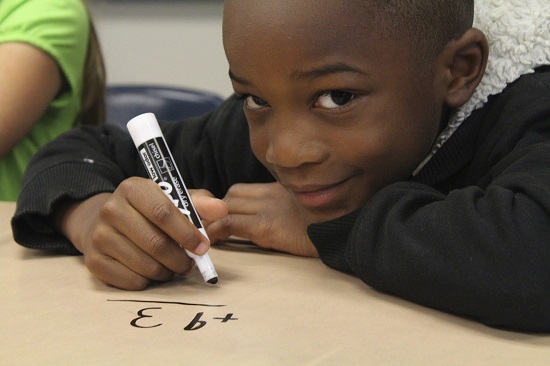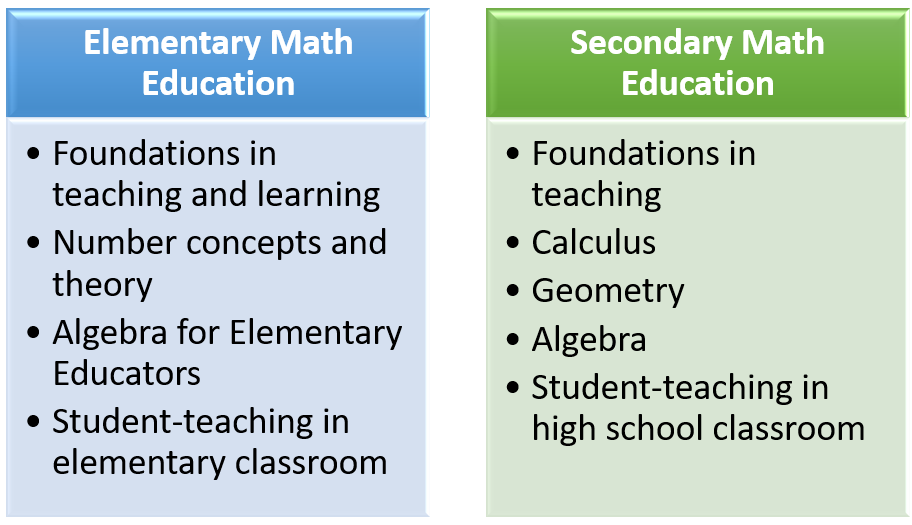If you dream of being a math teacher, it’s likely that you have a preference regarding which grade level you would prefer to teach. Although math teachers at all grade levels have the same general objective – to impart knowledge of mathematics principles and practices to their pupils – there’s a world of difference between teaching basic addition and subtraction to the youngest math learners and teaching an Advanced Placement (AP) calculus course to high school seniors preparing for college. Because these very different job roles are part of the same larger occupation, many colleges and universities that offer master’s degree programs in math education allow students to choose a specialization in elementary or high school math education.
IMAGE SOURCE: Pixabay, public domain
A Curriculum in Elementary Math Education
All math education programs blend coursework focused on math content with coursework focused on developing or enhancing skills and knowledge in teaching. Depending on your school and program structure, this may mean taking classes from both math and education disciplines, courses from an interdisciplinary math education department or some combination of the two. Although you may not envision yourself doing a ton of research as an elementary school math teacher, studies in math education research methods and analysis are common, as well. Even if you don’t plan to be a researcher, it is important that you are able to understand research in the field of math teaching and learning as it emerges throughout the course of your career so that you can incorporate research findings and best practices into your math lessons.
For graduate students pursuing an elementary math education concentration, coursework might begin with foundational studies in the pedagogical knowledge needed to teach math, methods of teaching math through problem-solving, math-focused curriculum and instruction and research in the field of math education. The content areas of study needed for an elementary math education specialization range from number concepts and number theory to algebraic and statistical reasoning, but these courses are usually designed specifically for teachers of elementary school and middle school.
More general courses in assessments in math education, teacher leadership and using technology for teaching and learning math may also be a required or optional part of the curriculum.
Secondary Math Education Coursework
High school teachers must have more in-depth knowledge of the higher-level mathematics content they cover with their students. It’s not unusual for a program that includes a specialization in secondary math education to require a class in advanced math teaching methods for high school, junior high school or even middle school students. Graduate students planning to teach at the high school level may need to meet minimum requirements of advanced mathematics courses in subjects such as calculus, geometry and algebra. In a secondary mathematics education program, students often use math electives to build out an area of focus that will help them better serve their future high school math students.
In both secondary and elementary math education programs, fieldwork experiences are required if seeking initial teaching certification but are often not required if the student is already an established, credentialed classroom teacher.
Differences Between Teaching Elementary and Secondary Mathematics
On the surface, the biggest difference between teaching math at the elementary and high school levels is the complexity of the content. After all, a typical first grader won’t be ready to grasp the intricacies of study in calculus, and most high school students have progressed far beyond the basic one-digit addition problems common in the early math lessons of elementary school.
However, it’s not only the math subject matter that makes educating elementary school children and high school students different. Students at these grade levels are at different stages of development. They learn and process information differently. A math teacher in the lowest grade levels of elementary school is unlikely to assign students to reach a book chapter independently and then assess their knowledge with a pop quiz. A high school senior preparing to take the challenging AP exam for college credit might feel frustrated, and as though his or her time is being wasted, by a teacher who suggests a “learning through play” approach that is common in teaching young children.
Both elementary and secondary school math teachers help students who are struggling. Math teachers also recognize students’ accomplishments – whether by recruiting standout students for Math League championships or by writing letters of recommendation.
Additional Resources
Are There Specific Master’s Programs for Different Math Subjects?
Are There Various Types of Master’s Under the Umbrella of Math Education?
What Degree Should a Math Teacher Have?
What Classes Will I Have to Take for a Degree in Mathematics Education?


